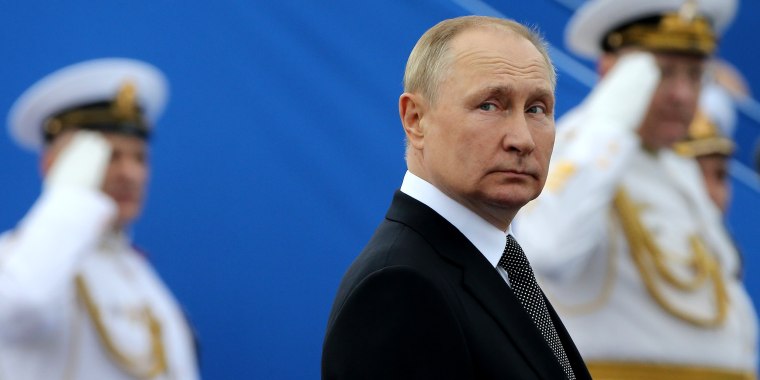Ukrainian forces have made astounding breakthroughs in their counteroffensive against Russian forces in northeastern Ukraine in the past week. President Volodymyr Zelenskyy said his troops have recaptured some 2,400 square miles of Ukrainian territory since the beginning of the month, a development that has exceeded the expectations of military experts and boosted morale across the country and the international coalition backing Kyiv. In the West, the news has sparked elation and talk of preparation for a Ukrainian victory.
But it cannot be assumed that these successes will push the war decisively in favor of Ukraine and set in motion a Russian withdrawal. In fact, it could incentivize Russia to commit even more intensely to the invasion.
Worryingly for Putin, nationalist hawks with megaphones think he has been too restrained.
Russia watchers point out that the prospect of national humiliation and increasingly vocal criticism from the hardcore nationalist right could compel Russian President Vladimir Putin to double down on the operation, with more manpower and more brutal tactics in the battlefield. “We’re back in a space where escalation is more likely than it was over the summer,” Emma Ashford, a senior fellow with the Reimagining U.S. Grand Strategy program at the Stimson Center, told me.
Ukraine's lightning advance has raised substantial questions about Russia’s capacity to achieve its aims of dominating the country and annexing sizable chunks of territory. “The Kremlin is facing diminishing returns with the ad-hoc methods to get volunteer soldiers and pulling equipment together from other units in Russia,” Dara Massicot, a researcher at the Rand Corporation specializing in Russian defense policy, wrote to me in an email. “Right now, their main effort is to stabilize their holdings in the Donbass and Kherson. Putin’s options to do this are narrowing. In that sense, pressure is mounting.”
Remember — Russia is technically only conducting what it calls a “special operation” in Ukraine and its military is still at roughly peacetime strength. It hasn’t committed to a full-scale mobilization, called up reserves or instituted a nationwide military draft. As the Financial Times reports, since Russia is not officially at war, "Moscow is not supposed to be deploying its regular conscripts to the front line and has instead sought to assemble volunteer battalions and relied on other forces, such as the domestic militarised police force Rosgvardia."
On top of greater uncertainty about Russia’s capacity to carry on with the limited resources it has deployed for the invasion, there is the issue of intensifying disapproval of Putin. While the Russian leader has strived to act unfazed by Russia’s retreats, concerns about military losses are growing louder domestically.
Some former lawmakers and pundits have recently openly questioned whether victory was possible in Ukraine and called for peace on Russian state television. And even more worryingly for Putin, nationalist hawks with megaphones think he has been too restrained. Influential pro-war bloggers, pundits and reporters are growing furious about Russia’s embarrassing losses to a far smaller country, and pushing for Putin to go all-in. As George Beebe, a former director of Russia analysis at the CIA, pointed out to me, over the past 10 to 15 years Putin has given the nationalist right more and more space to dominate Russia’s news and political discourse — and now they’re strongly positioned to pressure him to move to a full-fledged war footing.
Ashford described Putin as facing a classic authoritarian dilemma. If he were to move to fully mobilize Russia toward war, that could make the war less popular as the costs of the war are more fully felt by society. But the alternative of admitting that Ukraine can’t be defeated and looking for a negotiated settlement would infuriate nationalist elites who can damage Putin’s reputation and make his domestic standing vulnerable. Putin’s calculation here isn’t just determining the most strategically sound way to approach his failing war effort, but considering what’s less damaging for him politically.
Putin is likely particularly concerned about the nationalist pressure campaign, which is much larger and more influential than the war skeptic crowd, analysts say. He has been pushing the country in a nationalist direction for years, and while he's sought to quash pro-democracy dissent, the ultra-nationalists have space and credibility in media and social media. “The Kremlin is too scared to simply ignore the nationalist section of the population,” Pavel Luzhin, an independent Russian military expert, recently told the Guardian. Luzhin said that the pro-war commentators allow that part of the Russian public blow off steam, and likely operate with the unspoken approval of security services, per the Guardian.
None of this is to say escalation is inevitable. But any optimism should be cautious, as Ukraine and its supporting coalition are not yet out of the woods. If Russia were to commit to a full-scale mobilization, that could mean more troops on the ground, more deployment of serious military equipment, and more risk of escalation of war with NATO. It could also mean, as some pro-war Russians have called for, more ruthlessness against Ukrainians, whether that means being even more cavalier about civilian deaths or targeting infrastructure even more aggressively. Things could get far uglier still. Let’s hope they don’t.

